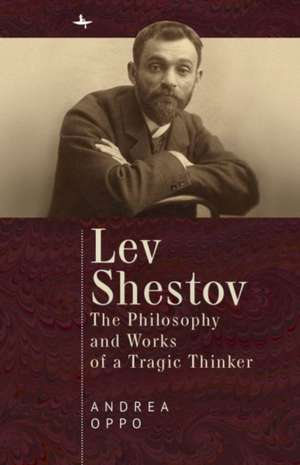Lev Shestov
Autor Andrea Oppoen Limba Engleză Hardback – 23 noi 2020
Preț: 721.83 lei
Preț vechi: 937.44 lei
-23% Nou
Puncte Express: 1083
Preț estimativ în valută:
138.12€ • 144.60$ • 114.29£
138.12€ • 144.60$ • 114.29£
Carte tipărită la comandă
Livrare economică 05-19 aprilie
Preluare comenzi: 021 569.72.76
Specificații
ISBN-13: 9781644694671
ISBN-10: 1644694670
Pagini: 346
Dimensiuni: 156 x 234 x 21 mm
Greutate: 0.66 kg
Editura: Academic Studies Press
ISBN-10: 1644694670
Pagini: 346
Dimensiuni: 156 x 234 x 21 mm
Greutate: 0.66 kg
Editura: Academic Studies Press
Cuprins
Table of Contents Acknowledgments
Editorial Notes
Introduction
Part One: Shestov in Russia
Chapter I: The Philosophy of Tragedy (1898¿1905)
1.1 Introduction: The Birth of a Tragic Conscience
1.2 Shestov before Shestov: Shakespeare and Pushkin
1.3 Tolstoi¿s Struggle between ¿Yasnaya Polyanä and ¿Astapovo¿
1.4 Friedrich Nietzsche: Truth against Morality
1.5 Dostoevskii and Nietzsche as ¿Philosophers of the Underground¿
1.6 Apotheosis of ¿Bespochvennost'¿: Towards a Philosophy of Tragedy
Chapter II: Art as Negativity¿The Literary Criticism Years (1901¿1910)
2.1 Introduction: Shestov and the Philosophical Problem of Art
2.2 Aestheticism and Ideology: On Merezhkovskii and Turgenev
2.3 Creatio ex Nihilo: Chekhov¿s Aesthetics
2.4 The ¿Oracular¿ Gratuity of Sologub¿s Prose and Poetry
2.5 Ibsen and the Destiny of Art
2.6 Retracting Tragedy: Dostoevskii as an Essayist
2.7 The ¿Magnificent¿ Vyacheslav Ivanov
Part Two: Shestov in France
Chapter III: Wandering Through the Souls (1914¿1929)
3.1 Introduction: The Events of History¿Shestov¿s Political Views
3.2 The Power of Keys: Faith and Church in Martin Luther
3.3 The Two Histories of Western Philosophy
3.4 The Fight against Self-Evidences: Dostoevskii, Pascal, and Spinoza
3.5 Philosophy¿s Revolt against Itself: Plotinus¿s Ecstasies
3.6 Audacities and Submissions: Shestov¿s Intellectual World
3.7 Shestov and the Russian Philosophers
Chapter IV: Athens and Jerusalem¿The Logic and the Thunder (1930¿1938)
4.1 Introduction: Shestov as a ¿Jewish Philosopher¿
4.2 The Bible and the Original Sin: In Dialogue with Martin Buber
4.3 The Last Encounter: Kierkegaard
4.4 Étienne Gilson and the Spirit of Medieval Philosophy
4.5 Philosophers in Chains: At the Sources of Metaphysics
Conclusion
1. Reception and Legacy of Shestov¿s Philosophy
2. The Question of Irrationalism and of ¿Antiphilosophy¿
3. The (Neo-)Platonic Paradigm: Shestov¿s ¿Third Sailing¿
4. Afterword: Reading between the Lines
Appendices
1. Shestov and Husserl
2. Shestov and Berdyaev
3. Shestov and Fondane
Bibliography and Works Cited
1. Shestov¿s Works
A.1 Books
A.2 Articles and Correspondence
2. Selected Studies on Shestov
B.1 Biographies, Memoirs, Specific Journals, and Bibliographies
B.2 Books on Shestov
B.3 Articles and Book Chapters on Shestov
3. Further References
Index
Editorial Notes
Introduction
Part One: Shestov in Russia
Chapter I: The Philosophy of Tragedy (1898¿1905)
1.1 Introduction: The Birth of a Tragic Conscience
1.2 Shestov before Shestov: Shakespeare and Pushkin
1.3 Tolstoi¿s Struggle between ¿Yasnaya Polyanä and ¿Astapovo¿
1.4 Friedrich Nietzsche: Truth against Morality
1.5 Dostoevskii and Nietzsche as ¿Philosophers of the Underground¿
1.6 Apotheosis of ¿Bespochvennost'¿: Towards a Philosophy of Tragedy
Chapter II: Art as Negativity¿The Literary Criticism Years (1901¿1910)
2.1 Introduction: Shestov and the Philosophical Problem of Art
2.2 Aestheticism and Ideology: On Merezhkovskii and Turgenev
2.3 Creatio ex Nihilo: Chekhov¿s Aesthetics
2.4 The ¿Oracular¿ Gratuity of Sologub¿s Prose and Poetry
2.5 Ibsen and the Destiny of Art
2.6 Retracting Tragedy: Dostoevskii as an Essayist
2.7 The ¿Magnificent¿ Vyacheslav Ivanov
Part Two: Shestov in France
Chapter III: Wandering Through the Souls (1914¿1929)
3.1 Introduction: The Events of History¿Shestov¿s Political Views
3.2 The Power of Keys: Faith and Church in Martin Luther
3.3 The Two Histories of Western Philosophy
3.4 The Fight against Self-Evidences: Dostoevskii, Pascal, and Spinoza
3.5 Philosophy¿s Revolt against Itself: Plotinus¿s Ecstasies
3.6 Audacities and Submissions: Shestov¿s Intellectual World
3.7 Shestov and the Russian Philosophers
Chapter IV: Athens and Jerusalem¿The Logic and the Thunder (1930¿1938)
4.1 Introduction: Shestov as a ¿Jewish Philosopher¿
4.2 The Bible and the Original Sin: In Dialogue with Martin Buber
4.3 The Last Encounter: Kierkegaard
4.4 Étienne Gilson and the Spirit of Medieval Philosophy
4.5 Philosophers in Chains: At the Sources of Metaphysics
Conclusion
1. Reception and Legacy of Shestov¿s Philosophy
2. The Question of Irrationalism and of ¿Antiphilosophy¿
3. The (Neo-)Platonic Paradigm: Shestov¿s ¿Third Sailing¿
4. Afterword: Reading between the Lines
Appendices
1. Shestov and Husserl
2. Shestov and Berdyaev
3. Shestov and Fondane
Bibliography and Works Cited
1. Shestov¿s Works
A.1 Books
A.2 Articles and Correspondence
2. Selected Studies on Shestov
B.1 Biographies, Memoirs, Specific Journals, and Bibliographies
B.2 Books on Shestov
B.3 Articles and Book Chapters on Shestov
3. Further References
Index
Descriere
Explores the entire life and work of the Russian philosopher Lev Shestov (1866-1938). The book offers keys to understanding his thought, while also tracing the historical itinerary of his work. This study will better determine the controversial and fascinating philosopher's place in the history of Russian and Western thought.
